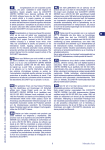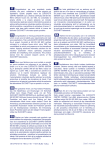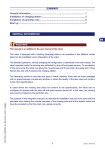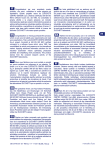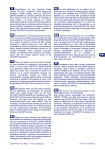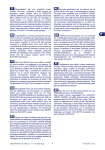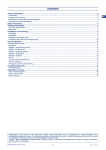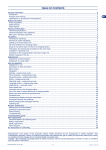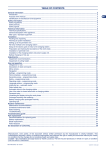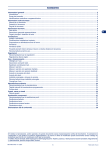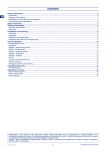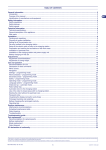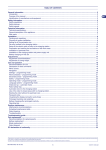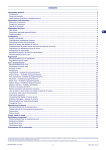Download EN EN FR DE ES NL DA FI SV IT
Transcript
Congratulazioni per aver acquistato questo IT prodotto, che potrà soddisfare le vostre esigenze ed aspettative. Questo progetto nasce da ZUCCHETTI CENTRO SISTEMI S.p.A. (Azienda certificata UNI EN ISO 9001) software house che, dal 1982, ha consolidato la propria attività e la propria presenza sul mercato internazionale. Applicare soluzioni informatiche avanzate al settore dell’automazione industriale significa ottimizzare le attività produttive e semplificare le procedure di lavoro. E’ proprio sulla base della costante attività di ricerca dei laboratori ZUCCHETTI che nasce questo prodotto. NL Van harte gefeliciteerd met uw aankoop van dit product dat aan al uw eisen en verwachtingen zal voldoen. Dit project werd ontwikkeld door ZUCCHETTI CENTRO SISTEMI S.p.A. (UNI EN ISO 9001 gecertificeerd bedrijf) software house, sinds 1982 actief op de internationale markt waar het een sterke positie verworven heeft. Het toepassen van innoverende computeroplossingen in de sector van industriële automatisering leidt tot optimalisering van de productiewerkzaamheden en werkprocedures. Dit product is vrucht van de continu inspanningen van de vorsers van de ZUCCHETTI laboratoria. EN Congratulations on having purchased this product, which we are sure will satisfy your requirements and meet your expectations. This is a ZUCCHETTI CENTRO SISTEMI S.p.A. project. Zucchetti (a UNI EN ISO 9001 certified company) is a software house which, since 1982, has consolidated its activity and presence on the international market. Applying advanced informatics solutions for the industrial automation means optimizing production activities and simplifying work procedures. This product derives from the constant research activity of the ZUCCHETTI laboratories. DA Tillykke med dit nye produkt, som vi er overbevist om, vil tilfredsstille alle dine behov og forventninger. Dette projekt blev født hos ZUCCHETTI CENTRO SISTEMI S.p.A. (som er et selskab med UNI EN ISO 9001 certificering) og deres softwarehouse, som siden 1982 har konsolideret sine aktiviteter og sin tilstedeværelse på det internationale marked. Anvendelsen af avancerede it-løsninger indenfor industriel automatisering betyder en optimering af produktionsaktiviteterne og en forenkling af arbejdsprocedurerne. Det er netop på grund af en konstant forskningsaktivitet hos ZUCCHETTI-laboratorierne, at dette produkt er blevet til. MD-CT-RO-01 - XX - REV 3.2 - EN - 10-2010 - ( L50BEU-L50BUS-L50DEU-L50DUS-L50EEU) FR Nous vous félicitons pour avoir acheté ce produit qui pourra satisfaire vos exigences et vos attentes. Ce projet a vu le jour chez ZUCCHETTI CENTRO SISTEMI S.p.A. (Entreprise certifiée UNI EN ISO 9001) maison de logiciel qui, à partir 1982, a consolidé son activité et sa présence sur le marché international. Appliquer des solutions informatiques évoluées au secteur de l’automatisation industrielle signifie optimiser les activités productives et simplifier les procédures de travail. C’est justement sur la base de la constante activité de recherche des laboratoires ZUCCHETTI que ce produit a vu le jour. FI Onnittelemme sinua tämän tuotteen hankkimisen johdosta. Olemme varmoja, että tuote täyttää tarpeesi ja odotuksesi. Tämän tuotteen on kehittänyt ZUCCHETTI CENTRO SISTEMI S.p.A (sertifioitu UNI EN ISO 9001), ohjelmistoalan yritys, joka on perustamisvuodestaan 1982 lähtien vahvistanut toimintaansa ja rooliaan kansainvälisillä markkinoilla. Pitkälle kehitettyjen ohjelmistoratkaisujen käyttö tehdasautomaatiossa tarkoittaa tuotantotoimintojen optimointia sekä työprosessin yksinkertaistamista. Tämä tuote on kehitetty ZUCCHETTIN tutkimuslaboratorioiden jatkuvan tutkimustyön tuloksena. DE Wir gratulieren Ihnen zum Kauf dieses Produktes, das Ihre Bedürfnisse und Erwartungen mit Sicherheit erfüllen kann. Dieses Projekt wurde von der Firma ZUCCHETTI CENTRO SISTEMI S.p.A. (zertifiziert nach UNI EN ISO 9001) Software House entwickelt, die seit 1982 ihre Produktion und damit auch ihre Stellung auf dem internationalen Markt immer weiter ausbaut. Durch die Anwendung zukunftsweisender Software-Lösungen in der industriellen Automation werden die Produktion optimiert und die Arbeitsprozesse vereinfacht. Die Entwicklung dieses Produktes basiert auf den stetigen Forschungsaktivitäten der ZUCCHETTI-Labore. SV Tack för att ni har köpt denna produkt som kan tillfredsställa era behov och förväntningar. Detta projekt kommer ursprungligen från ZUCCHETTI CENTRO SISTEMI S.p.A.(AB) programvaruhus (företag certifierat enligt UNI EN ISO 9001) som, sedan 1982, har befäst sin verksamhet och närvaro på den internationella marknaden. Tillämpning av avancerade IT-lösningar inom den industriella automationssektorn innebär en optimering av den produktiva verksamheten och en förenkling av arbetsprocedurerna. Det är just till följd av den konstanta forskningen som pågår i ZUCCHETTI’s laboratorier som denna produkt har tillkommit. ES Gracias por haber comprado este producto que podrá satisfacer sus exigencias y expectativas. Este proyecto nace de la experiencia de ZUCCHETTI CENTRO SISTEMI S.p.A. (empresa certificada de conformidad con la norma UNI EN ISO 9001), empresa de software que desde el año 1982 ha consolidado su propia actividad y presencia en el mercado internacional. Aplicar soluciones informáticas avanzadas al sector de la automatización industrial significa optimizar las actividades productivas y simplificar los procedimientos de trabajo. Este producto es fruto de la constante actividad de investigación de los laboratorios ZUCCHETTI. 1 User’s manual EN IT: Dichiarazione di conformità / GB: Declaration of conformity / FR: Déclaration de conformité DE: Konformitätsbestätigung / ES: Declaración de conformidad / NL: Verklaring van overeenstemming DA: Overensstemmelseserklæring / FI: Vaatimustenmukaisuusvakuutus / SV: Konformitetsdeklaration ZUCCHETTI Centro Sistemi S.p.A. Via Lungarno 305/A Terranuova B.ni (AR) ITALY EN IT Dichiara sotto la propria responsabilità che il prodotto modello L50BEU, L50BUS, L50DEU, L50DUS, L50EEU, è conforme alle seguenti norme europee : Sicurezza: CEI EN (50338: 2007-06) (60335-1: 2008-07) Compatibilità Elettromagnetica : CEI EN (55014-1: 2008 -01) - (55014-2: 1998 -10) (55014-2/A1: 2002 -08) - (55014-2/A2: 2008 -12) CEI EN (61000-3-2: 2007-04) - (61000-3-3: 1997-06) - (61000-3-3/A1: 2002-05) DE Erklärung in eigener Verantwortung: dieses Produkt der Modelle L50BEU, L50BUS, L50DEU, L50DUS, L50EEU, entspricht folgenden europäischen Normen: Sicherheit: CEI EN (50338: 2007-06) (60335-1: 2008-07) Elektromagnetische Konformität: CEI EN (55014-1: 2008 -01) - (55014-2: 1998 -10) (55014-2/A1: 2002 -08) - (55014-2/A2: 2008 -12) CEI EN (61000-3-2: 2007-04) - (61000-3-3: 1997-06) - (61000-3-3/A1: 2002-05) E’ conforme ai requisiti essenziali delle seguenti Direttive : Direttiva Bassa Tensione 2006/95 CE Compatibilità Elettromagnetica 2004/108 CE - Rumore Aereo 2006/42 CE Es entspricht im wesentlichen den Anforderungen folgender Richtlinien: Niederspannungsrichtlinie 2006/95 EG – Elektromagnetische Kompatibilität 2004/108 EG – Luftschall 2006/42 EG EN Hereby declares under their full responsiblity that the products, models L50BEU, L50BUS, L50DEU, L50DUS, L50EEU, conform to the following European standards: Safety: CEI EN (50338: 2007-06) – (60335-1: 2008-07). Electromagnetic compatibility: CEI EN (55014-1: 2008-01) – (55014-2: 1998-10) – (55014-2/A: 2002-08) – (55014-2/A2: 2008-12) – CEI EN (61000-3-2: 2007-04) – (61000-3-3: 1997-06) – (61000-3-/A1: 2002-05) ES Declara bajo su propia responsablidad que el producto modelo L50BEU, L50BUS, L50DEU, L50DUS, L50EEU, es conforme a las siguientes normas europeas: Seguridad: CEI EN (50338: 2007-06) (60335-1: 2008-07) Compatibilidad electromagnética: CEI EN (55014-1: 2008 -01) - (55014-2: 1998 -10) - (55014-2/A1: 2002 -08) - (55014-2/ A2: 2008 -12) CEI EN (61000-3-2: 2007-04) - (61000-3-3: 1997-06) - (61000-3-3/A1: 2002-05) FI Vakuuttaa omala vastuullaan, että tuote mallia L50BEU, L50BUS, L50DEU, L50DUS, L50EEU, vastaa seuraavien eurooppalaisten standardien vaatimuksia: Turvallisuus : CEI EN (50338: 2007-06) (60335-1: 2008-07) Sähkömagneettinen yhteensopivuus : CEI EN (55014-1: 2008 -01) - (55014-2: 1998 -10) - (55014-2/A1: 2002 -08) (55014-2/A2: 2008 -12) CEI EN (61000-3-2: 2007-04) - (61000-3-3: 1997-06) - (61000-3-3/A1: 2002-05) Es conforme a los requisitos esenciales de las siguientes Directivas: Directiva de baja tensión 2006/95 CE Compatibilidad electromagnética 2004/108 CE - Ruido aéreo 2006/42 CE Vastaa seuraavien direktiivien oleellisia vaatimuksia : Pienjännitedirektiivi 2006/95/EY Sähkömagneettinen yhteensopivuus 2004/108/EY - Konedirektiivi 2006/42/ EY NL Verklaart onder zijn verantwoordelijkheid dat het product model L50BEU, L50BUS, L50DEU, L50DUS, L50EEU, conform de volgende Europese normen is: Veiligheid: CEI EN (50338: 2007-06) (60335-1: 2008-07) Elektromagnetische Compatibiliteit: CEI EN (55014-1: 2008 -01) - (55014-2: 1998 -10) - (55014-2/A1: 2002 -08) - (55014-2/ A2: 2008 -12) CEI EN (61000-3-2: 2007-04) - (61000-3-3: 1997-06) - (61000-3-3/A1: 2002-05) SV Förklarar under eget ansvar att produktmodellerna L50BEU, L50BUS, L50DEU och L50DUS, L50EEU, överensstämmer med följande europeiska standarder: Säkerhet: CEI EN (50338: 2007-06) (60335-1: 2008-07) Elektromagnetisk kompatibilitet: CEI EN (55014-1: 2008 -01) - (55014-2: 1998 -10) - (55014-2/A1: 2002 -08) - (55014-2/A2: 2008 -12) CEI EN (61000-3-2: 2007-04) - (61000-3-3: 1997-06) - (61000-3-3/A1: 2002-05) En conform de essentiële vereisten van de volgende Richtlijnen is: Richtlijn Laagspanning 2006/95 EG - Elektromagnetische Compatibiliteit 2004/108 EG - Lawaai 2006/42 EG Det överensstämmer med de nödvändiga kraven i följande direktiv: Lågspänningsdirektivet 2006/95/ EG - Elektromagnetisk kompatibilitet 2004/108/EG - Luftburet buller 2006/42/ EG They conform to the essential requirements of the following Directives: Low Voltage Directive 2006/95 EC – Electromagnetic Compatibility 2004/108 EC – Aerial Noise 2006/42 EC FR Déclare sous sa responsabilité que le produit modèle L50BEU, L50BUS, L50DEU, L50DUS, L50EEU, est conforme aux normes européennes suivantes : Sécurité : CEI EN (50338: 2007-06) (60335-1: 2008-07) Compatibilité électromagnétique : CEI EN (55014-1: 2008 -01) - (55014-2: 1998 -10) - (55014-2/A1 : 2002 -08) - (55014-2/ A2 : 2008 -12) CEI EN (61000-3-2: 2007-04) - (61000-3-3: 1997-06) - (61000-3-3/A1 : 2002-05) Est conforme aux conditions requises essentielles des Directives suivantes : Directive Basse Tension 2006/95 CE - Compatibilité Électromagnétique 2004/108 CE - Bruit Aérien 2006/42 CE DA Erklærer på eget ansvar, at produktet model L50BEU, L50BUS, L50DEU, L50DUS, L50EEU, er i overensstemmelse med følgende europæiske standarder : Sikkerhed : IEC EN (50338: 2007-06) (60335-1: 2008-07) Elektromagnetisk kompatibilitet : IEC EN (55014-1: 2008 -01) - (55014-2: 1998 -10) - (55014-2/A1: 2002 -08) - (55014-2/ A2: 2008 -12) IEC EN (61000-3-2: 2007-04) - (61000-3-3: 1997-06) - (61000-3-3/A1: 2002-05) Er i overensstemmelse med de væsentligste krav i følgende direktiver : Lavstrømsdirektiv 2006/95 EC - Direktiv for eletromagnetisk kompatibilitet 2004/108 EC - Direktiv for luftbåren støj 2006/42 EC Bernini Fabrizio - Terranuova B.ni 06 April 2009 (Amministratore delegato) - (Chief executive officer) - (Administrateur délegué) - (Geschäftsführer) (Director general) - (Diracteur) - (Administrerende direktør) - (Pääjohtaja) - (Styrelseordförande) User’s manual 2 TABLES OF CONTENTS General information ....................................................................................... 5 Technical information .................................................................................... 7 Safety information ....................................................................................... 11 Installation ................................................................................................... 14 Adjustments ................................................................................................. 27 Use and operation ....................................................................................... 28 Maintenance ................................................................................................ 37 Troubleshooting Guide ................................................................................ 39 Parts Replacement ...................................................................................... 43 EN DETAILED INDEX A Adjustment of cutting height, 27 Appliance and Manufacturer, identification, 6 Appliance, general description, 7 B Battery recharge after prolonged inactivity, 36 Battery recharge on first use, 26 Blade, height adjustment, 27 Blade replacement, 43 C Changing the curb drop-off sensor, 44 Cutting height, adjustment, 27 D Defining the boundaries of the work areas, 19 Description of robot commands, 28 G General description of the appliance, 7 I Identification of manufacturer and appliance, 6 Initial start up, 30 Installation of charging station, 16 L LED lights combinations, meaning, 29 M Main organs, 8 Maintenance recommendations, 37 Manual, purpose of, 5 Manufacturer and appliance, identification, 6 O Operating tips, 37 P Packing and unpacking, 14 Parts replacement, recommendations for, 43 Plant and appliance installation, planning, 15 3 User’s manual Preparation and defining the boundaries of the work areas, 19 Prolonged inactivity and restarting, 36 Purpose of the manual, 5 R Recommendations for parts replacement, 43 Recommendations for the regulations, 27 Robot automatic stop, 35 Robot cleaning, 38 Robot safety devices, 12 Robot safety stop, 34 S EN Safety distances, possible elements inside the work area, 25 Safety for man and the environment during disposal, 13 Safety regulations, 11 Safety, robot devices, 12 Safety signals, 13 Slopes, 23 Steep slopes, 24 T Technical assistance, 6 Technical specifications, 9 Tips, operating, 37 Troubleshooting, 39 U Unpacking and packing, 14 User recommendations, 28 W Work areas, preparation and boundaries, 19 Reproduction, even partial, of this document without the Manufacturer’s written authorisation is strictly forbidden. The manufacturer implements a policy of continual improvement and reserves the right to modify this document without prior notice on condition that the modifications do not constitute a health and safety risk. © 2008 – Text, illustrations and page layout by Tipolito La Zecca. The text can be reproduced, in whole or in part, on condition that the author is mentioned. User’s manual 4 GENERAL INFORMATION PURPOSE OF THE MANUAL • This manual forms an integral part of the appliance and was produced by the Manufacturer to provide the necessary information to people authorised to interact with it during its expected working life. • Operators of the appliance must adopt correct working techniques and must carefully read and follow the instructions contained in this manual. • This information is provided by the Manufacturer in its original language of Italian and may be translated into other languages for legal and/or commercial purposes. • Carefully read the instructions in this manual to avoid unnecessary risks relating to personal health and safety and economic damages. • Keep this manual in a safe and easily accessible place for quick reference. • Some information and illustrations contained in this manual may not perfectly correspond to the appliance in your possession, however, this does not compromise its functioning. • The manufacturer has the right to make changes without notice. • The following symbols are used throughout this manual to highlight particularly important information or to indicate important specifications. Danger - Attention This symbol identifies situations of imminent danger, which, if ignored, could lead to serious bodily injury or death. Warning - Caution This symbol identifies situations where it is necessary to behave in a certain way to avoid serious bodily injury and to not cause damage to the appliance. Important This symbol identifies particularly important technical information, which , if not followed, could lead to damage to the robot. 5 User’s manual EN IDENTIFICATION OF MANUFACTURER AND APPLIANCE The data plate shown is applied directly onto the appliance. It contains references to information which is essential for safely operating the machine. EN A–Manufacturer Identification. B–CE conformity label. C–Serial model/number and manufacturing year. D–Technical specifications. DATA PLATE er (A) Identification of manufacturer (B) CE conformity label (C) Model (D) Technical specifications (C) Serial number (C) Manufacturing year REQUESTING TECHNICAL ASSISTANCE For any technical requirement, please contact the Technical service centre of the Manufacturer or an authorised centre. For technical assistance, indicate the data reported on the data plate, the approximate operating hours and the type of fault detected. User’s manual 6 TECHNICAL INFORMATION GENERAL DESCRIPTION OF THE APPLIANCE The appliance is a robot designed and built to automatically cut grass in gardens and lawns at any time of the day. It is small, compact, silent and easy to handle depending on the type of lawn that is being mowed. During operation, the robot mows the area delimited by paving and/or barriers (fences, walls, etc.). When the robot detects that there is no grass or encounters an obstacle, it changes route in a random manner and starts mowing again in a new direction. Based on its operating principle (“random”), the robot automatically mows the entire delimited area of the lawn (see figure). The maximum lawn surface that the robot can mow depends on a series of factors, such as: • the characteristics of the area (irregular perimeters, uneven surfaces, divided areas, etc.) • the characteristics of the lawn (type and height of the grass, humidity, etc.) • the condition of the blade (level of sharpness, grass or debris buildup, etc.) • the model of the robot and type of batteries installed RANDOM OPERATION 7 User’s manual EN MAIN COMPONENTS EN A–Battery: supplies power to the blade and wheel motors B–Power Supply Unit: used to recharge or keep the batteries charged (A). C–Mother board: controls the automatic functions of the robot. D–Control keyboard: used to set and display the operating modes of the robot. E–Cutting blade: mows the lawn. F–Electric motor: operates the cutting blade (E). G–Electric motor: one operates the right wheel transmission unit, while the other operates the left wheel. H–Sensors: used to recognise the characteristics of the ground on which the robot is operating. I – Curb drop-off sensors: detect any holes or empty spaces. They are positioned in line with the wheels making it easy to change direction before any steps. L–Transmitter: transmits the signal to the guide wire. M-Charging station: this is needed to recharge or keep the batteries charged (A) N- Covering hood F L G B N A C M E D I H H User’s manual 8 TECHNICAL DATA Model Description L50BEU L50DEU L50BUS L50DUS L50EEU Maximum recommended surface that can be mowed Each daily working cycle m2 (sq 800 (8600 sq ft) 400 (4300 sq ft) ft) Characteristics Size (W x H x D) mm (in.) Robot weight (inc. battery) kg Cutting height (Min-Max) mm 4-pronged blade diameter mm (in.) 409 x 199 x 335 (16,10 x 7,83 x 13,19 in) 7,9 409 x 220 x 335 (16,10 x 8,65 x 13,19 in) 8,2 10,3 34-40 (1,34-1,58 in) 48-72 (1,88-2,84 in) 34-40 (1,34-1,58 in) 4WD Electric motors Ground speed 8,3 250 (9,84) (in.) Drive system Cutting blade speed 10,6 V RPM cc (25,2V) 4000 Cut 2200 Maintenance Meters/ minute 16 (52,48 ft.) % 50% according to lawn condition. The maximum slope allowable in proximity of the outside edge or the guide wire is 35% Suggested maximum slope Ambient working temperature -10°(14 F.) (Min) +42° (107 F.) (Max) Measured sound output dB(A) 72(Max) - 65(Lawn maintenance) Water protection class IP IP21 Electric features Meanwell system Certificate No. E307078 Classe 2 (Vin 90 - 264Vac) AC current (typ.) 1.2A/115Vac 0.7A/230Vac Input Frequency range 47 - 63Hz Charger (for lithium batteries) Battery type and charger Rechargeable Li-Ion battery V-A 25,2V – 6,9Ah Charger V-A 29,3 Vcc - 2,0 Ah Minimum recharging time and method 3 hours - manual 3 hours automatic *Note: Model names vary by country. In North and South America L50BUS, L50DUS, and L50EEU are replaced by LB1200 and LB1500.* 9 User’s manual EN Average working time * 3,5 Hours Safety blade stop Anti-tilting sensor Standard equipment Lifting sensor Standard equipment Equipment Charging station Not Available Standard equipment Covering hood Not Available Optional Signal transmitter Not Available Standard equipment m (ft) Not Available 10 (33 ft) ø1,5mm N. 6 Standard equipment EN Perimeter wire Grass detection sensor (patented) Curb drop-off sensors (Step) (Patented) Optional Standard equipment Optional Standard equipment Blade modulation Standard equipment Mowed lawn detection sensors (patented) Standard equipment Border accessories 8-pronged blade Optional Specifically for early season rapid growth and for lawns that need greater mowing power. Optional Cleaning disc (patented) Disc that is fitted above the cutting blade. It helps keep the underbody clean. Specially indicated for areas where the grass is very wet. Optional * Based on the conditions of the grass and grassy surface. User’s manual 10 SAFETY INFORMATION SAFETY REGULATIONS • During the design and construction, the Manufacturer carefully considered the personal health and safety risks of those operating with the robot. In addition to respecting the applicable current laws, the Manufacturer adopted all the “regulations of good manufacturing techniques”. The purpose of this information is to advise users on placing special attention to prevent risks of injury. However, prudence and caution is irreplaceable. Safety is also in the hands of operators who interact with the appliance. • When using the robot for the first time, it is recommended to carefully read the entire manual and to fully understand it, particularly any and all safety information. • Carefully read the instructions in this manual and those that apply directly to the machine, especially the safety information. Carefully study this manual to prevent injury or accidents. It is always too late to remember what you should have done after the fact. • Lift and move the robot according to the information reported directly on the packaging, on the appliance and in the user instructions provided by the Manufacturer. • Pay attention to the symbols that appear on the robot and in this manual; their shape and colour are important for safety purposes. Keep them legible and follow the instructions. • The lawn mower can only be used by people who know how to operate it and who have read and understood the instructions in this manual. • Only use the robot for the intended purposes specified by the manufacturer. Improper use of the robot may lead to serious injury or death. • Before using the lawn mower, make sure that there are no objects on the lawn (toys, branches, clothing items, etc.). • When using the robot, make sure the work area is clear of people (in particular, children, the elderly or disabled people) and domestic animals to prevent safety risks. To prevent this risk, it is recommended to operate the production activity of the robot in suitable times. • Never allow people to sit on the robot. • Never lift the robot to inspect the blade during operation. • Do not place hands and feet under the robot at any time. • Do not tamper with, sidestep, eliminate or bypass the safety devices installed. The non-observance of this requirement may cause serious personal injury or death. • Keep the lawn mower in conditions of maximum efficiency by carrying out the maintenance operations provided for by the Manufacturer. Proper maintenance will allow obtaining the best performances and longer operating times. • Before carrying out any maintenance and adjustments, disconnect the electric power supply. The user must ensure that all the necessary safety conditions are in place, especially when working on the lower part of the lawn mower, following the Manufacturer’s procedures. • Use the personal protection devices prescribed for by the Manufacturer, in particular, always wear gloves when working on the blades and cutting disc. • Before replacing the batteries, always remove the blade. 11 User’s manual EN • Only qualified persons, having the necessary technical expertise and skill, should attempt to work on or repair this robot. Failure to observe these requirements could result in serious injury. • The Manufacturer shall not be held liable if non-original spare parts are used. • Replace worn parts with original spare parts to guarantee the functionality and safety level. • Do not use the robot on too wet grass or when it is raining. • Never use and recharge the robot in explosive and/or flammable environments. EN ROBOT SAFETY DEVICES 1. Lift sensor In the event that the robot is lifted from the ground, the blade will stop rotating in less than two seconds. 2. Bumpers The bumper sensor is activated when the mower strikes a solid object, which will stop the movement in that direction and reverse itself away from the obstacle. 3. Inclinometer If the robot works on a slope which is steeper than the maximum limit, or tips over, the robot will stop the movement in that direction and reverse to avoid the slope. 4. Emergency stop switch Located on the top outer surface of the robot, red in colour. Pressing this button at any time during operation will stop immediately all mower movements and stop the rotation of the blades within two seconds (< 2 seconds). 5. Over-current protection Each of the motors (blade and wheels) are monitored continuously during operation for any situation that may cause these motors to overheat. If this occurs in the wheel motor, the robot will attempt to move in the opposite direction. If the over-current persists, the robot will stop and signal an error. If the cutting motor overheats, then there are two types of intervention. If the parameters fall within the first range, the robot will carry out the manoeuvre to unblock the cutting blade. If the over-current is below the protection range, the robot will stop and signal a motor error. User’s manual 12 SAFETY FOR MAN AND THE ENVIRONMENT DURING DISPOSAL • Do not disregard material into the environment. Dispose of the robot according to the applicable regulations. • In reference to the WEEE Directive (Waste of Electrical and Electronic Equipment), during the phasing out of the machine, the user must separate the electrical and electronic components and dispose of them in special authorised waste collection centres, or take them back to the retailer when purchasing a new one. • All the parts, which must be collected separated and disposed of in a specific manner, are marked with a special label. • Unauthorised disposal of Waste of Electric and Electronic Equipment (WEEE) is punishable with sanctions regulated by the laws in force in the territory where the infraction has been verified. • To implement the European directives (2002/95/CE, 2002/96/CE, 2003/108/CE) in the Italian territory, for example, a legislative decree was issued (No. 151 of 25 July 2005) which provides for an administrative fine of 2000÷5000 Euro. Danger - Attention Electric and Electronic Equipment may contain hazardous substances having potentially harmful effects on the environment and people. It is recommended to correctly dispose of this waste. SAFETY SIGNALS Attention! Do not use a water hose to clean or wash the robot. Keep hands and feet well away from the cutting blade. Do not place your hands or feet beneath the body or close to the robot when it is working. Read the instructions and ensure that you fully understand them before using the robot. Keep children, pets and other people a safe distance away when the robot is in operation. The warnings and safety instructions given in this manual must be followed. Failure to do so could lead to machine breakage and/or serious bodily injury. This product conforms to the current EC directives. 13 User’s manual EN INSTALLATION PACKING AND UNPACKING The robot is delivered suitably packed. When unpacking, carefully remove it and check the integrity of the parts. The contents contain all necessary equipment for operating the robot. Packing contents A–Robot EN B–Power supply unit C–Spacer-ring kit D–User Manual Important • The list only includes standard parts. Check the quantity and integrity of any optional accessories requested. • Keep the packing materials for future use. D MANUAL C ROBOT BLADE SPACER RING KIT TO ADJUST THE CUTTING HEIGHT A B PACKING BOX User’s manual 14 POWER SUPPLY UNIT PLANNING OF PLANT INSTALLATION The robot is not difficult to install, but requires some preliminary planning in order to define the best area for installing the power supply unit and the boundaries of the robot’s work area. Position the power supply unit in an easy to access zone. – The power supply unit must be in a well-ventilated area, protected from direct sunlight and exposure to the elements. – The power supply unit must not be in direct contact with the ground or humid environments. Danger - Attention Do not recharge the robot in explosive and/or flammable environments. Warning - Caution When connecting the electricity, it is necessary that a power outlet is positioned next to the installation area. Make sure that the connection to the mains power conforms to the applicable regulations and standards. Warning - Caution It is recommended to install the unit in a cabinet for electric components (for outdoor or indoor use), well-ventilated to maintain a correct air re-circulation and equipped with a key lock so that only authorised people can access the power supply. 15 User’s manual INSTALLATION OF CHARGING STATION The charging station must be positioned on the edge of the lawn, preferably in the largest area where other areas of the lawn are easily accessible. OK OK NO NO NO NO EN Position the charging station according to these rules: - The area must the flat - The ground must be compact and stable with good drainage - Choose the widest lawn area - In case of sprinklers, make sure the water jets are not directed inside the charging station. - The power cord must move away from the charging station on the outside of the cutting area. - The entrance of the charging station must be positioned as shown in the figure so that the robot can enter it by following the guide wire in a clockwise direction. - There must be a straight area of 200 cm (78.74 in.) in front of the charging station. - The charging station must be well fastened to the ground; to prevent a small step from forming in front of the base, position a piece of fake grass at its entrance as a prevention measure. Alternatively, remove part of the grassy surface and install the base flush with the grass. - The charging station must be connected to the power supply-transmitter unit via a cord that must move away from the charging station on the outside of the cutting area. power supply transm tter un t H min 160 cm / 63 inc 35 cm / 13 78 inc 35 cm / 13 78 inc charging stat on 200 cm / 78 74 inc OK 100 cm / 39 37 inc NO User’s manual 16 90° At the end of the work cycle, the robot will move as shown in the figure, coasting along the edge of the lawn until encountering the reentry wire. It will then follow the re-entry wire in a clockwise direction. To make it easier for the robot to find the re-entry wire of the charging station, install the wire so that it extends to the areas to be mowed and that the wire runs along any objects (e.g. a pool) inside the lawn area, where the robot would take a long time to exit. If the garden has a passage that is narrower than 150 cm (59.05 in.) between one area and another, the guide wire must be setup in another area so that it can be easily intercepted by the robot. m n 150 cm / 59 05 nc EN Start laying the guide wire from behind the charging station and leave a couple of meters for cutting it down to size when connecting to the unit. Position the wire in a clockwise direction along the entire track and secure it with the pegs supplied (maximum distance of 100 cm (39.37 in.) between each peg). In straight stretches, fasten the wire so that it is not too tight, curved and/or twisted. In stretches that are not straight, fasten the wire so that it is not twisted but curves in a regular manner. EXTERNAL BORDER It is possible to set up the robot to work with an external border like with the models of the higher range. It is default for the LB1500 Spyder EVO to work in this mode. You simply switch the robot “ON” and then switch the “Start” button within wired area. If the robot does not respond to the signal or recognize the border, place the robot within the wired area an proceed with the following: Switch the robot on with the button “ON” and hold it down for ~ 4-5 seconds till the led “PAUSE” is flashing. Release the “ON” button while it is flashing the required configuration. - Led “PAUSE”. The robot works with an external border which limits the lawn and the possible objects around the lawn where the robot must not work. Without Charging base: -When the robot has completed an area or has depleted its battery, it will start “bouncing” along the perimeter wire, as described in the picture below. -At this point, it will be time to stop the robot, turn it off, and bring it to the recharge location. With charging base: -The robot will return to the charging base by “bouncing” along the perimeter wire. The robot will work within an area limited by a border and return to the charging base when the battery is depleted. 17 User’s manual *See instructions on the following page for proper installation for LB1500 with charging base* Returns to the recharge base by “bouncing” along the perimeter wire The LB1500 Spyder EVO is programmed to return to the charging base by “bouncing” along the perimeter wire. EN This requires a unique way of lying of the perimeter wire. A “antennae gate” positioned in front of the recharging base, as shown in the picture, is required for proper docking. The robot goes along the perimeter wire and from time to time it touches the wire with a bounce movement until it recognizes the “antennae gate” to the recharging base. The robot follows along the perimeter for about 10m until it reaches the recharging base. This system is advantageous for the following reasons. - Less tire tracks because the transit on the grass is always in different points. - The recharging base can be reached faster. - The robot works better on the big slopes. The “antennae gate” indicates to the robot that it is not only close to the recharging base but also that it is close to a narrow passage or close to returning to the recharging base. As soon as it has recognized a “antennae gate”, the robot follows the perimeter wire with a slow speed and in a more precise way for about 10m., then it returns to “bouncing” along the perimeter wire if it does not find the recharging base. Please follow this rules to install the “antennae gate” - The “antennae gate” is a part of a wire which extends in the yard for 2 m. and with a distance between the wires of 5 cm. - The “antennae gate” should be positioned in the section before the recharging base between 4 and 10 m. - The “antennae gate” should be positioned in the sections before the narrow passages less than 2m away to ensure it make the passage. * If, for approximately 20 minutes, the robot does not find the recharging base, it will follow the perimeter wire.* Important A buried wire or a wire laid on the ground can be joined to other wires having the same characteristics (see figure). Make sure to use self-binding tape (for example, 3M Scotch 23) when joining two wires. Do not use insulating tape or any other type of joining systems (wire terminals, clamps, etc.). 1 3 2 4 EN Remove the protection (L). transmitter (B) current power supply unit (A) H min 160 cm (63 00 inc ) protection (L) EN Insert the guide wire (M) under the base. perimeter wire (M) Connect the two ends of the wire to the terminals of the base. The incoming and outgoing wires must not intersect (see the figure). Connect the power cord of the charging station to the transmitter (B). Connect the plug of the power supply unit (A) to the electrical outlet. black terminal If the LED flashes, the connection is correct. If not, search for the fault (see “Troubleshooting Guide”). red terminal Replace the protection (L). Fasten the base (N) to the ground with the pegs (P). pegs (P) screw anchors (Q) charging station (N) User’s manual 18 The illustrations show an example of the internal and peripheral elements of the correct work area. If elements such as tree roots or exposed wires are present, it is necessary to delimit the perimeter of these elements with paving, walls or barriers to prevent the malfunctioning of the robot. Elements (trees, poles, etc. ref. fig. obstacles) which do not impede the robot’s normal functioning do not require delimiting. OBSTACLES OK EN PROTECTIONS OK Do not, under any circumstance, leave areas which have not been delimited by barriers inside the work area, as these will prevent the robot from functioning properly (roots, external pipes, work tools, etc.). ROOTS NO 21 User’s manual Attention! If fine gravel, leaves or small stones are used to border the lawn, they are not detected correctly by the robot. Protect the lawn with other borders. Fine gravel OK NO EN Attention! Sharp corners In areas of the lawn that end in narrow spaces as shown in the figure, the robot cannot move easily, therefore this part of the lawn must be excluded because the robot would exit the borders. NO User’s manual 22 SLOPES Check that all the areas of the lawn do not exceed the admissible slopes (see “Technical Specifications”, page 9). Areas with steeper slopes or that are incompatible with the correct functioning of the robot (see following points) cannot be mowed. Steeper slopes must be delimited. Important The sensors of the robot can detect slopes greater than the robot can manage. The direction is reversed in order to prevent the robot from tipping over or malfunctioning. In addition, as a further protection, it is necessary to delimit the areas, which have slopes that cannot be managed. EN It is recommended to test the robot when using for the first time on slopes that are at the limit of the specifications. UPWARD SLOPE OK % +50 . 1m Greater than 1 m / 39,3 inc included between 0 and +50% The robot can tackle height differences with a slope of up to 50% provided that they gradually slope down over a distance of more than one metre. DOWNWARD SLOPE OK 50% . 1m Greater than 1 m / 39,3 inc included between 0 and 50% 23 User’s manual STEEP SLOPES The robot’s safety system will interpret sudden changes in the slope (greater than 25%) as an anomaly and therefore, will reverse the direction and bring the robot back to safety continuing to mow the lawn. Tree trunks which gradually rise from the ground or stones positioned to mark the boundary of flower-strips which gently descend onto the grassy surface are also interpreted as slope changes. Important Check the robot when using for the first time on slopes that are at the limit of the specifications. UPWARD SLOPE EN OK % +25 included between 0° and +25% The robot can tackle height differences with slopes of up to 25% if they slope down suddenly. DOWNWARD SLOPE OK 25% included between 0° and -25% Important Areas with slopes greater than those specified cannot be mowed with the robot. User’s manual 24 POSSIBLE ELEMENTS INSIDE THE WORK AREA AND RELATIVE SAFETY DISTANCES APPROPRIATE POOL PREPARATION minimum width of non-grassy ground of 70 cm. / 27,5 inc. Minimum pavement width of 50 cm. / 19,6 inc.. OK WATER EN minimum wall height of 9 cm. / 3,5 inc. protection arches The figure above shows a work area which has been correctly delimited for the correct functioning of the robot. Important Foliage is usually detected as grass. In case of foliage, we suggest to increase the distance from the edge by about 20 cm (7,88 inc). INAPPROPRIATE POOL PREPARATION Pavement width less than 50 cm. / 19,6 inc. no presence of non-grassy ground NO WATER wall height less than 9 cm. / 3,5 inc. land width less than 70 cm. / 27,5 inc. The figure above shows a work area where the robot’s operating areas have not been correctly delimited, thus preventing it from functioning properly. 25 User’s manual BATTERY RECHARGE ON FIRST USE Position the robot next to the recharging zone. 1. Check that the power supply unit is connected to the electricity power (110V or 220V). ROBOT WITH NO CHARGING STATION 2. Connect the black plug to the wheel containing the black “-” symbol. 3. Connect the red plug to the wheel containing the red “+” symbol. ROBOT WITH CHARGING STATION 2. Position the robot in the charging station with the red “+” symbol positioned on the outside of the cutting area, as shown in the figure. EN Once connected, the robot automatically turns on to show the recharging level of the batteries. (see “meaning of LED combination” on page 29). Once completely charged, disconnect the robot and press “OFF” power supply transmitter unit H min 160 cm / 63 nc Correctly connect the recharging knobs to the nuts found on the wheels of the robot. The figure shows the correct installation of the robot’s recharging zone. Important On first recharge, the batteries be charged connected for at least 24 hours. User’s manual 26 ADJUSTMENTS RECOMMENDATIONS FOR ADJUSTMENTS Important • The user must follow the procedures described in this manual when making any adjustments. Do not make any adjustment which is not expressly indicated in this manual. • Any special adjustments, not expressly indicated in this manual, must only be carried out by personnel from the Manufacturer’s Authorised Service Centres. ADJUSTMENT OF CUTTING HEIGHT 1 – Stop the robot safely by pressing the ON/OFF key (see “Robot safety stop”, page 34). EN INSERTING SPACERS WITH SCREWS 2 – Turn over the robot and position it so as not to ruin the covering hood. Important Use protective gloves to prevent injury to your hands. 3 – Unscrew the screws to remove the blade. 4 – Insert one or more spacers to adjust the cutting height as shown in the table on page 9. INSERTING BLADE WITH SCREWS check that the slope of the blade w th he robot in the start posit on s facing downwards 5 – Reposition the blade (see page 43) and fasten the screws. 6 – Turn the robot over to its operating position. Important Reduce the cutting height gradually. It is recommended to add the spacers every 2÷3 days in order to gradually reach the ideal height of the grassy surface. 27 User’s manual USE AND OPERATION USER RECOMMENDATIONS Important • When using the robot for the first time, it is recommended to carefully read the entire manual and to fully understand it, especially the safety information. • Only use the robot for the uses intended by the Manufacturer and do not tamper with any device to obtain different performances. EN DESCRIPTION OF ROBOT COMMANDS The illustration shows the position of the commands on the machine. A – ON/OFF: press to turn the robot on and off. B – START/STOP: press to start or stop the robot when it is on standby. User’s manual 28 MEANING OF LED COMBINATIONS IN OPERATION STEADY ON robot in operation STEADY ON full battery level 1 FLASH medium battery level STEADY ON low battery level STEADY ON in pause in pause due to low battery ON OFF ON HIGH BATTERY EN 1 LOW BATTERY A PAUSE 1 1 FLASH the lawn has been mowed 2 2 FLASHES no grass present STEADY ON robot in operation STEADY ON full battery level 1 FLASH medium battery level STEADY ON low battery level RECHARGING ON OFF ON HIGH BATTERY 1 LOW BATTERY A O PAUSE 29 User’s manual START-UP. ROBOT WITH CHARGING STATION Preliminary operations: 1. Check that the grassy surface of the lawn to mow is at a height which is compatible with the proper functioning of the robot (see technical specifications on page 9). 2. Adjust the desired cutting height (see cutting height adjustment on page 27). 3. Check that the work area is correctly delimited and that there are no impediments to the correct functioning of the robot as indicated in the section “Preparation and defining the boundaries of the work areas” and following sections. 4. Disconnect the robot from the recharging area (page 26). 5. Position the robot inside the grassy surface in an area where the grass is at least 1 metre (40.0 in.) from any obstacle. EN The robot starts a daily work cycle based on the starting time of the work cycle used the last time it was turned on. For example, to mow the lawn everyday at 1:00pm, wait for 1:00pm and start the robot: 6. Press the OFF/ON key and wait a few seconds for the robot to turn on completely. 7. Press START/STOP key to start the robot. At the end of the work cycle, the robot will go back to the charging station to recharge itself and wait for the next scheduled work cycle at the same time the next day. If the robot is paused during the work cycle without being turned off and then started again, the start time of the work cycle remains the same as that of the last time the robot was turned on. To send the robot to the charging station during the work cycle, keep the START/STOP button pressed for 4 seconds until the robot starts moving again in search of the charging station. To execute another work cycle while the robot is in the charging station without waiting for the set time, press START/STOP. The robot exits from the charging station and executes a work cycle. On completion, it will go back to the charging station and will start mowing at the time programmed on the previous start-up. START-UP. ROBOT WITH NO CHARGING STATION 1. Check that the grassy surface of the lawn to mow is at a height which is compatible with the proper functioning of the robot (see technical specifications on page 9). 2. Adjust the desired cutting height (see cutting height adjustment on page 27). 3. Check that the work area is correctly delimited and that there are no impediments to the correct functioning of the robot as indicated in the section “Preparation and defining the boundaries of the work areas” and following sections. 4. Disconnect the robot from the recharging area (page 26). 5. Position the robot inside the grassy surface in an area where the grass is at least 1 metre (40.0 in.) from any obstacle. 6. Press the OFF/ON key and wait a few seconds for the robot to turn on completely. 7. Press START/STOP key to start the robot. Once the robot has stopped due to the reasons described in the chapter “Robot Stop”, activate the safety stop and reposition the robot inside the power supply unit for recharging (see page 26). User’s manual 30 Important For a better cutting performance and correct functioning of the recognition sensor, do not start the robot in case of rain or in very humid conditions. The best results are obtained in the middle of the day. OPERATION WITH DELAYED START If necessary, the robot can be delayed to start by up to 24 hours. With the robot in PAUSE mode, briefly press the OFF/ON button at intervals of around 1 second, with each pressing delaying the start time of the operation by one hour. On completion of the sequence, wait for the robot to confirm the delay setting with the sound of a beep. Press the “START/STOP” button to confirm the procedure. Depending on the model, the Robot will go in “stand-by” mode or go back to the charging station to wait for the preset departure time. If the START/STOP button is not pressed, the robot will go in stand-by anyway until the preset time. Important In case of errors, turn off the robot by keeping the ON/OFF button pressed, and resume the start-up sequence. OPERATION WITH DELAY OPERATION With the robot in PAUSE mode, press the ON/OFF button for each hour of delay e g 4 times = 4 hours Wait 4 beeps = 4 hours The Robot goes into STAND BY or moves towards the charging station waiting for the preset departure time Press START/STOP 31 User’s manual EN STARTING THE ROBOT WITH THE SENSORS TURNED OFF In certain lawn conditions, the robot can be started with the lawn and curb drop-off sensors deactivated, which means the robot can be started when lawn conditions are such that correct functions are not guaranteed, for example with very short or patchy grass. This mode requires very special attention from the user, and the dealer should be consulted before attempting to operate in this mode. When the robot is on Pause, these modes can be activated following this procedure: With the curb drop-off sensor installed, minimum width 10 cm /4.0 inches. GULF EN Grass Sensor Off – Curb drop-off sensor On: Press the START/STOP button and keep it pressed for 4 seconds until 2 consecutive beeps are heard and the PAUSE led flashes twice. This mode must only be used on models with the curb drop-off sensor installed, and it allows working with just the 4 curb drop-off sensors. This mode is recommended in gardens where the lawn is lower than the sensors but still very uniform. GRASS SENSOR OFF CURB DROP-OFF SENSOR ON Keep the START button pressed for 4 seconds. Wait for 2 beeps + 4 sec User’s manual 32 2 flashes Release the button Minimum width 25 cm / 9.8 inches. GRASS SENSOR Grass Sensor On – Curb drop-off sensor Off: Press the START/STOP button and keep it pressed for 8 seconds until 3 consecutive beeps are heard and the PAUSE led flashes three times. This mode must only be used on models with the curb drop-off sensor installed, and it allows working with just the front grass detector sensors. This mode is recommended with uneven surfaces with lots of sharp dips or sparse grass. 33 User’s manual GRASS SENSOR OFF CURB DROP-OFF SENSOR OFF Keep the START button pressed for 12 seconds. Wait for 4 beeps + Release the button 4 flashes 12 sec ROBOT SAFETY STOP EN When using the robot, you may safely stop it at any time by pressing the “ON/OFF” key. Important The robot safety stop is necessary when carrying out any maintenance and repairs (for example: cleaning, adjustments to cutting height, etc.). User’s manual 34 ROBOT STOP The robot stops automatically if the following conditions are detected: • Lawn mowed: The sensor has detected that the lawn has been mowed and therefore, does not require further mowing. Recharge the batteries and start the robot again after one or two days based on the growth of the grass. • No grass: The grass-detection sensors have not detected the presence of grass for an extended period. • Discharged batteries: The batteries have used up their operating capacity. • Batteries in protection: When the batteries have reached a capacity which is lower than the level of the discharged batteries, the robot completely turns off without displaying any indication. In this case, connect the robot to the recharger. The robot will not turn on immediately, as normally occurs, but only after a few minutes. IN PAUSE STEADY ON ON STEADY ON OF discharged batteries HIGH BATTERY STEADY ON in pause LOW BATTERY START TOP PAUSE 1 1 FLASHING the lawn has been mow 2 2 FLASHING no grass present 35 User’s manual EN PROLONGED INACTIVITY AND RESTARTING If the robot has not been used for a long period of time, it is necessary to carry out a series of operations to guarantee the correct functioning at the time of its reuse. 1 – Accurately clean the robot and charging station. (see “Robot Cleaning”, page 38). 2 – Recharge the battery at least every 5 months for lithium batteries. 3 – Store the robot in a protected and dry location with an ambient temperature between 10° and 30 °C (50°F - 86°F), out of reach of children, animals, etc. 4 – Disconnect the power point from the power supply unit. 5 – Cover the charging station to prevent foreign objects from entering inside (leaves, paper, etc.) and to preserve the contact plates. EN Restarting Follow these procedures before restarting the robot after a long period of inactivity: 1 – Connect the plug of the power supply unit to the electrical outlet. 2 – Reactivate the main electrical power supply. 3 – Place the button of the power supply unit on “ON”. 4 – Recharge the batteries of the robot for at least 12 hours. 5 – Once the recharging has been completed, operate the robot normally. BATTERY RECHARGE AFTER PROLONGED INACTIVITY Danger - Attention Do not recharge the robot in explosive and inflammable environments. Position the robot next to the recharging zone. 1. Make sure the charging knobs are clean. ROBOT WITH CHARGING STATION 2. Position the robot in the charging station with the red “+” symbol positioned on the outside of the cutting area, as shown in the figure. ROBOT WITH NO CHARGING STATION 2. Check that the power supply unit is connected to the electrical power (110V or 220V). 3. Connect the black plug to the wheel containing the black “-” symbol. 4. Connect the red plug to the wheel containing the red “+” symbol. 5. Once connected, the robot automatically turns on to show the recharging level of the batteries. (see “meaning of LED combination” on page 29). At the end of the charging, disconnect the robot and press “OFF” Important Recharge the battery at least every 5 months for lithium batteries. User’s manual 36 OPERATING TIPS Below are some helpful operating tips when using the robot. • Even after being suitably informed on the use of the robot, simulate some test manoeuvres on first use to identify the commands and main functions. • Check and secure the fastening screws of the main components. • Mow the lawn frequently to avoid excessive growth of the grass. • Do not use the robot to mow grass which is shorter than 3 cm (1.18 in.) in respect to the cutting blade. • If the lawn is equipped with an automatic sprinkler system, make sure the robot finishes its work cycle at least one hour before the start of the watering to prevent damage to the robot itself and to the sprinklers. • Check the slope of the ground and make sure the maximum values admissible are not exceeded so that the use of the robot does not cause dangers. • When using the robot, make sure the area to mow is clear of people (in particular, children, the elderly, or disabled people) and domestic animals to prevent safety risks. To minimize chance of injury, operate the robot during times when the yard is not being used. • Do not use the robot in case of rain or strong humidity. The best results are obtained in the middle of the day. ORDINARY MAINTENANCE MAINTENANCE RECOMMENDATIONS Important • During maintenance operations, use personal protection equipment indicated by the Manufacturer, especially when working on the blade. • Before carrying out any maintenance, make sure the robot is turned OFF (see “Robot Safety Stop”, page 31). SCHEDULED MAINTENANCE TABLE Frequency Part Type of maintenance Reference Clean and check the efficiency of the blade See “Robot Cleaning”, page 38 Replace the blade if bent due to an impact or if it is worn out. See “Blade replacement”,page 43 Curb drop-off sensor Remove any excess grass. Change the sensors if they are damaged. See “Changing the curb drop-off sensors” page 44. Charging knobs of the robot and contact plates of the charging station. Clean and remove any oxidations See “Robot Cleaning” Robot Clean the robot See “Robot Cleaning” Blade Weekly Monthly 37 User’s manual EN ROBOT CLEANING 1 – Stop the robot safely (see “Robot safety stop”, page 34). Warning - Caution Use protective gloves to avoid the risk of injury. 2 – Clean the outside surfaces of the robot with a sponge using warm water and mild detergent. Wring the sponge out well to remove any excess water before use. Warning - Caution Do not use a water hose to clean the robot. Water could get inside the robot and damage the components. EN 3 – Do not use solvents or benzene so as not to damage the painted surfaces and plastic components. 4 – Do not wash the internal parts of the robot and do not use jets of pressurised water so as not to damage the electric and electronic components. Warning - Caution In order to not cause irreversible damage to the electric and electronic components, do not immerse the robot, in water because it is not watertight. 5 – Check the lower part of the robot (cutting blade area and wheels) and remove any deposits and/or residuals that may obstruct the correct functioning of the robot. 6 – To remove any deposits and/or other residuals from the blade, use a suitable brush. 7 – Clean the knobs of the battery charger, the contact plates in the charging station and remove any deposits or residuals caused by electric contacts with a dry cloth and, if necessary, with fine sandpaper. 8 – Clean the inside of the charging station to remove any accumulated residuals. 9 – Check the level of sharpness of the cutting blade. If necessary, sharpen. User’s manual 38 FAILURES, CAUSES AND REMEDIES TROUBLESHOOTING The information below is designed to help identify and correct any faults and/or malfunctions which may occur during operation. Some failures can be resolved by the user; others require specific technical skills or special abilities and therefore must only be resolved by qualified personnel with certified experience gained in the specific field of intervention. EN Problem The robot is very noisy Cause Remedy Cutting blade damaged. Replace the blade with a new one (see “Blade Replacement”, page 43). Cutting blade fouled (tapes, ropes, plastic fragments, etc.). Stop the robot safely (see “Robot safety stop”, page 34). Use protective gloves to avoid the risk of injury. Remove the debris from the blade. The robot was started too close to obstacles (less than 1 m. (40 in.) away) or in the presence of unexpected obstacles (fallen branches, forgotten objects, etc.). Electric motor failure Too high grass. 39 Stop the robot safely (see “Robot safety stop”, page 34). Remove the obstacles and restart the robot. Have the motor repaired or replaced by the nearest authorised service centre. Increase the cutting height (see “Cutting height adjustment” on page 27). Carry out a preliminary cutting of the area with a normal lawnmower. User’s manual Problem The work area is not completely mowed. EN The “wheel motor error” LED flashes. (1 or 2 flashes of the green ON LED). User’s manual Cause Remedy Not enough work hours Extend the working times Cutting blade fouled with deposits and/or residuals Stop the robot safely (see “Robot safety stop”, page 34). Use protective gloves to avoid the risk of injury. Clean the cutting blade. Cutting blade worn. Replace the blade with original spare parts (see “Blade Replacement”, page 43). Work area is too big compared to the actual capacity of the robot Adjust the work area (see “Technical Specifications”, page 9). The batteries are about to end their life cycle Replace the batteries with original spare parts. The batteries do not recharge completely Clean and remove any oxidizations from the contact points of the batteries (see “Robot Cleaning, page 38). Recharge the batteries for at least 12 hours. Uneven ground or ground with obstacles that impede movement Check that the lawn to mow is even and does not have any holes, stones or other obstacles. If so, fill in any holes and remove any obstacles (see “Preparation and defining the boundaries of the work areas”, page 19). One or both wheel motors has a fault. Have the motor repaired or replaced by the nearest authorised service centre 40 Problem The flashing of the LEDs signals a “motor/blade error”. 3 flashes of the green ON LED. The “tip-over error” LED flashes. 4 LEDs (ON) flashing consecutively. 4 Cause Remedy Cutting blade damaged. Replace the blade with a new one (see “Blade Replacement”, page 43). Cutting blade fouled (tape, ropes, plastic fragments, etc.) Stop the robot safely (see “Robot Safety Stop”, page 34). Use protective gloves to avoid the risk of injury. Remove the cause of fouling of the blade. The robot was started too close to obstacles (less than 1 m. (40.0 in.) away) or in the presence of unexpected obstacles (fallen branches, forgotten objects, etc.). Remove the obstacles and restart the robot. Electric motor failure Have the motor repaired or replaced by the nearest authorised service centre. Too high grass. Increase the cutting height (see “Cutting height adjustment,” page 27). Carry out a preliminary cutting of the area with a normal lawnmower. Ground with too much slope or with undefined borders. Check the installation rules. “See page 19 and following pages.” Tip-over sensor failure. Try to restart the robot. If the problem persists, have the robot repaired by the nearest authorised service centre. 4 FLASHES tip over error ON OFF ON The flashing led signals “Gulf error” Led (ON) 5 consecutive flashes. Stop the robot safely (see “Robot safety stop”, page 34). When the robot is started it does not detect the curb drop-off sensor data correctly. 41 Clean the sensors and start the robot again. If the problem continues, decide whether to start the robot with the curb drop-off sensors off, otherwise contact the Authorised Service Centre closest to you. User’s manual EN The robot does not turn on. Batteries in protection under the minimum level. Connect the robot to the recharger and wait for up to 4 hours. If it still does not turn on, contact the nearest authorised service centre. No electricity. Check that the power supply unit is correctly connected to the power outlet. Fuse interrupted. Have the fuse replaced by the nearest authorised service centre. Incorrect positioning of the guide wire or power cord of the charging station. Check the connection of the charging station. Collapsing of ground next to the charging station. Position the charging station on a flat and stable surface. The transmitter LED is off. Make sure the power supply unit is correctly connected to the power outlet. The power supply unit does not turn on. EN The robot does not position itself correctly inside the charging station. The robot does not recognise the guide wire for re-entering The transmitter LED is on and steady. into the charging station. The transmitter LED is flashing. Check for any interruptions in the guide wire. If necessary, join the wire. Make sure the guide wire is installed properly. ERROR SIGNALS 1 1 FLASH right motor error 2 2 FLASHES left motor error 3 3 FLASHES blade error 4 4 FLASHES tip-over error 5 5 FLASHES curb drop-off sensor error ON OFF ON HIGH BATTERY LOW BATTERY R PAUSE User’s manual 42 RECOMMENDATIONS FOR REPLACING PARTS Important Carry out the replacement operations and repairs according to the Manufacturer’s instructions, or contact the Service Centre if these operations are not included in the manual. BLADE REPLACEMENT 1 – Stop the robot safely (see “Robot safety stop”, page 34). INSERTING BLADE WITH SCREWS check that the slope of the blade, with the robot in the start position, is facing downwards EN Important Use protective gloves to avoid the risk of cutting your hands. 2 – Turn over the robot and position it so as not to ruin the covering hood. 3 – Unscrew the screws to remove the blade. 4 – Insert a new blade and fasten the screws. 5 – Adjust the cutting height (see “Cutting height adjustment”, page 27). BLADE 2 6 – Turn the robot over to its operating position. 43 User’s manual CHANGING THE CURB DROP-OFF SENSOR 1. Stop the robot in safe conditions (see “Safely stopping the robot”, page 34). Curb drop-off sensors Dismantling (A) Important Use safety gloves to prevent risk of injury. EN 2. Turn the robot over and place it so that the cover is not damaged. 3. Unscrew the screws (A) to remove the curb drop-off sensor blocks. 4. Change the curb drop-off sensor block and tighten the screws. 5. Turn the robot back over to the working position. Curb drop-off sensors Replacement ROBOT DISPOSAL Danger - Attention Do not pollute. Please dispose of old components in accordance with local laws. User’s manual 44















































